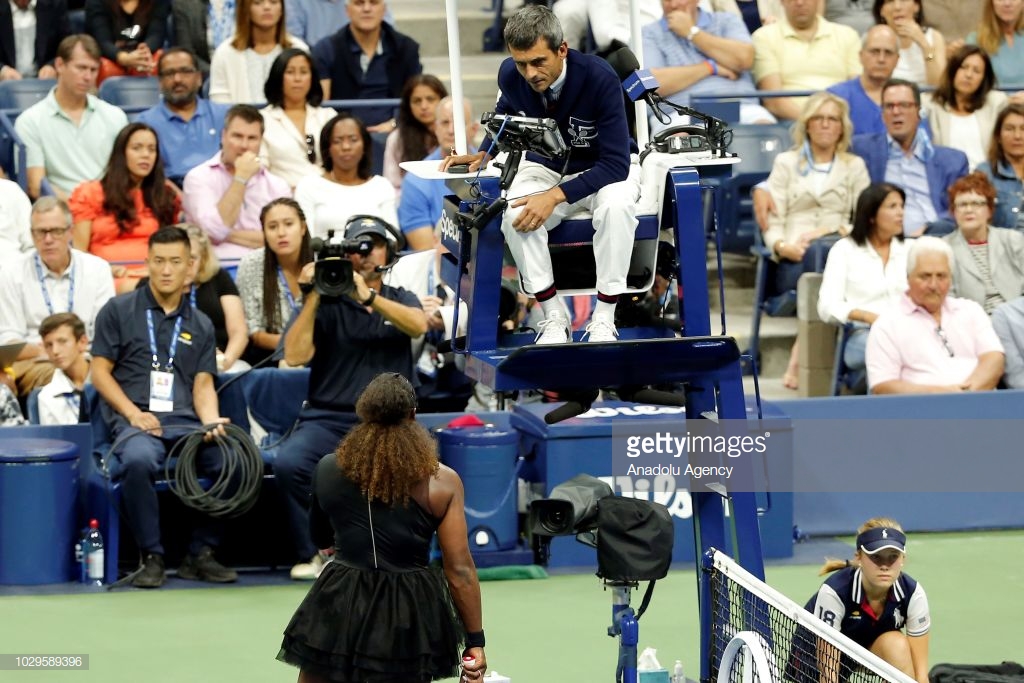
NEW YORK, USA – SEPTEMBER 8: Serena Williams of USA debates with the chair umpire Carlos Ramos as she competes against Naomi Osaka (not seen) of Japan during US Open 2018 women’s final match on September 8, 2018 in New York, United States. (Photo by Mohammed Elshamy/Anadolu Agency/Getty Images)
CLICK HERE FOR ALTERNATIVE VIEWS ON THIS PIECE.
In just one tennis match, Serena Williams lived a condensed version of something we all as women have encountered in bits and pieces throughout our lives.
She was there to compete as a world class tennis player – and Naomi Osaka presented as a formidable competitor. Instead, she was left to fight for her sex and against the sexism on the court presented a steady onslaught of figurative balls impossible for her to return.
If you haven’t already, I suggest you take the time to read the transcript of her dialogue with the umpire Carlos Ramos. To be fair, her interaction could be described as confrontational at times, but I resent it being characterized as an “outburst” or “meltdown” as it has in some headlines and by some commentators. She was doing something many of us are called to do when we believe something is unjust. And it’s important to note that male players have had outbursts for less worthy reasons. Andre Agassi spit on an umpire in one game. John McEnroe made a career out of it. The disparity wasn’t lost on Williams in the moment on Saturday.
“Do you know how many other men do things that are much worse than that?” she asked.
In my work life, I’ve been dismissed as emotional when I challenged a supervisor. I’ve been called a *itch when I stood up for myself. And I’m not alone. One of my very good friends was told she needed to “smile more” by a supervisor at an international company. I’ve even caught my husband whittling down something I’ve said or done to “that time of the month.”
I believe it happens in bits and pieces so often, that many of us opt to shrug it off at times, because if we challenged it every time, we’d dig our hole deeper in the eyes of our sexist accuser.
So what’s the solution? We must recreate standards in our work and personal lives that make it off limits for people like Ramos to respond in such a way. Workplaces are not segregated by gender, and there must be a standard of professionalism and behavior to adhere to. With that being said, let’s remember that the patriarchal model and standards in a majority of our work environments were established by men. We are most certainly wired differently than our male counterparts and continually requiring us to play by the rules they made seems ridiculous.
The other interaction at the match that I found significant was the way Williams comforted a very upset Osaka at the end of the match and spoke up for her in post-coverage. The young player who idolized Williams from the time she was a child was caught in the crossfire of an umpire inserting his ego in a match where he shouldn’t. Her victory was marred by “boos” and the headline from her victory is the confrontation her opponent had with the Ramos, versus the way she played.
Even this is emblematic of the female work life experience. So often we rise in our lives on the shoulders of other women, who for whatever reason, have displeased male management. Early in my career for a news network, I was promoted because my counterpart had the audacity to have a baby, or stand her ground, etc. And in the end, I was dismissed in that same career when I chose family over work myself.
I applaud Williams for standing up for herself. It very likely cost her the match. And we owe it to her and ourselves to keep volleying this ball back and forth until people like Ramos stop bringing their sexism to the table.

There are no comments
Add yours